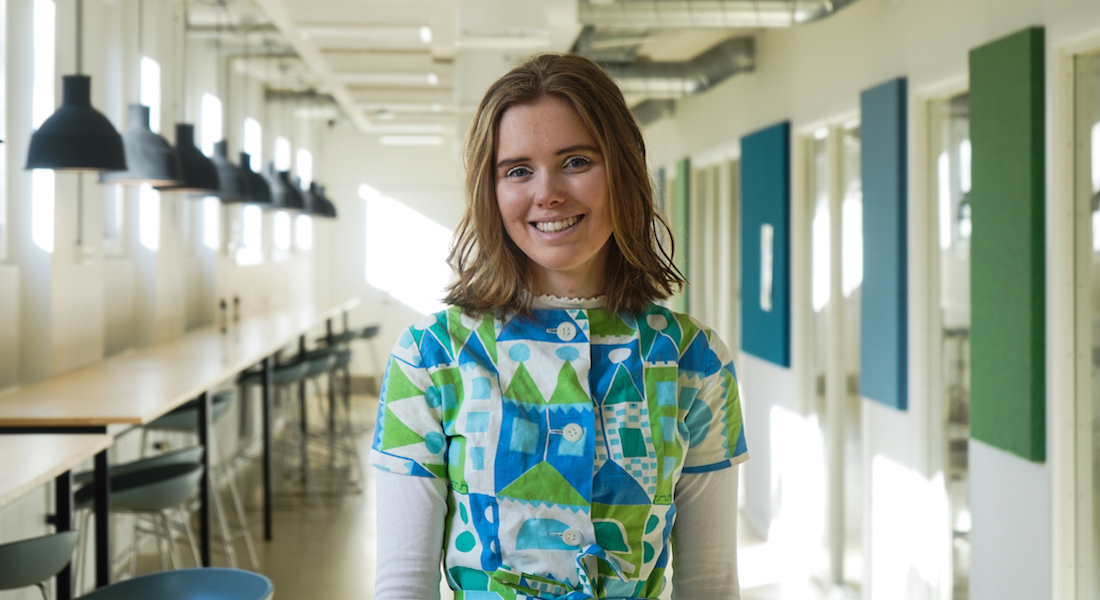Programmer by day, author by night
When Sofie Riis Endahl tells people that she works as an author and studies machine learning and data science, she is being met with great surprise. But for Sofie it makes good sense to combine her interest in artificial intelligence with her knowledge of language and literature, and she does not think that one should exclude the other.

21-year-old Sofie Riis Endahl has always known that she would like to work with artificial intelligence, and it was in particular the development of autonomous cars, translation technologies and the ethical aspects associated with the use of artificial intelligence that aroused her interest in the subject. For Sofie, it was therefore a question of finding a degree programme that would give her the right skills to work with this, and in the summer of 2020, she applied for the Bachelor's degree programme in machine learning and data science at the Department of Computer Science at the University of Copenhagen.
Unlike many of her fellow students, Sofie comes from a humanistic high school background, where she has had courses like music, English and German at a high level. And she has worked as an author since she was 17 years old. She often finds that people – especially in the writing and publishing industry – are surprised when she says that she is studying at DIKU. They simply do not understand how she can be interested in writing and programming, as she herself explains.
But the combination of the two interests is never something Sofie has seen as a problem. On the contrary, it is something she uses to her advantage.
- Since I'm an author, I've always found language interesting. I definitely feel that it gives me some competences to develop a different kind of technology. The pharmaceutical industry is perhaps more obvious for some others, where language technology is more obvious to me, says Sofie Riis Endahl, who was recently nominated for Politiken's literature prize for her youth novel “Pixie lever stadig".
When Sofie is studying, she uses her knowledge of languages and linguistics to understand and immerse herself in the theory behind language technologies such as voice recognition and machine translation. Here, you need to be familiar with the language to develop the best solutions. And in the same way, she also uses her knowledge and experience from the world of computer science when she writes her books.
- When you write a code, it's a question of formulating things as briefly and concisely and optimally as possible, and that's also what I do when I write a book, she explains.
And even though her books are not about artificial intelligence or data science, she still draws attention to the ethical aspects of the use of artificial intelligence in her narratives. She writes about what it means to grow up as a digital native and be young in a world where the opportunities and consequences of social media are ubiquitous.

Programming is for both writing geeks and spring gymnasts
In the future, Sofie hopes that the computer science programmes will be characterised by much more diversity. Because even though she do not think much about the fact that she is a woman in a still male-dominated profession, she is nevertheless very conscious of the significance of factors such as gender, age and interests has for the development of artificial intelligence.
- It is important to know what it is that you are making technology based on, and if everyone who is educated from the Department of Computer Science only knows something about a specific thing, then it is also only a very specific type of intelligence that we can develop. You can never develop an artificial intelligence or an algorithm without putting your own personal bias on it, which means that almost all of the artificial intelligence that has been made right now is biased towards men. That's why I think it's extremely important that the group of people who develop the technology is as diverse as the users, she says.
According to Sofie, machine learning and data science is for everyone – both writing geeks, spring gymnasts and aquarium fish enthusiasts – and if we are to develop artificial intelligence that can change and improve the world, she believes that we need to put our different competences, experiences and interests into play.
Contact
Rebekka Grage Rasmussen
Communication Consultant, Department of Computer Science
rgr@di.ku.dk
